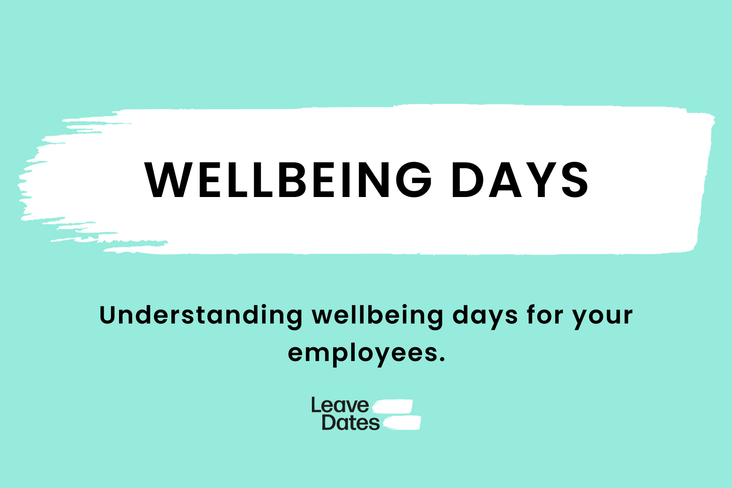
In this article
Quick takeaways
- In the UK, ill mental health is treated like any other sickness for the purposes and eligibility of statutory sick pay (SSP).
- To give your team a morale boost and reduce stigma, a clear policy and empathetic workplace culture around mental health is vital.
- Employers are legally required to protect the wellbeing of all employees. This includes providing reasonable adjustments to work, confidentiality and non-discrimination.
Good mental health in the workforce has enormous benefits for any organisation. A clear sick leave policy can mean staff stay longer, take fewer sick days, and do better work. This guide covers current law, best practices and good policy benefits.
What is mental health leave?
Mental health leave is time off from work to address emotional and psychological wellbeing issues.
In a work context, wellbeing refers to being able to perform our jobs in a way that maintains our health. It has an impact on how we cope with stress, make decisions and interact with colleagues.
Even in a small team, it’s likely that some employees will suffer from mental health conditions at some point. One in four people will experience such issues at some time.
Some common conditions include stress, burnout, depression and anxiety. Less common conditions can fall into the category of psychiatric or personality disorders. A person’s ability to work while suffering from such a condition may change. At some times, they may be able to function normally, while at other times, they may need more support.
Not all of these issues need time off work. But taking time off can be an opportunity to recover or seek help.
What is an employer’s duty of care for mental health in the UK?
The good news for employers is that the law in the UK is relatively straightforward. You must treat mental health leave in the same way as any other sick leave. We’ll review a few additional legal responsibilities for employers here.
The Health and Safety at Work Act 1974 requires employers to protect all employees’ physical and mental health. They must take all reasonable steps to support an employee’s wellbeing. This includes respecting the employee's boundaries around communication, a recent ruling against the HMRC shows how costly it can be to mistreat employees on sick leave.
Reasonable support includes:
- ensuring the work environment is safe;
- offering regular breaks or flexible hours;
- protection from discrimination;
- regular risk assessments.
The Management of Health and Safety at Work Regulations 1999 require health and safety risk assessments that are ‘sufficient and suitable’ for each case in the same way that it would apply to a physical injury.

Disability discrimination
Some mental health conditions may be considered a disability under the Equality Act 2010. This could be the case if the condition is ‘substantial’ and ‘long-term’, significantly impacting daily life, and has been ongoing for over 12 months.
People are protected from discrimination if their condition is classed as a disability. Employers must take reasonable steps to protect employees from discrimination.
Is mental health leave considered sick leave?
Yes, it is. In the UK, employees taking sick leave for mental health reasons are entitled to Statutory Sick Pay (SSP) after three days.
Sick days simplified
Track sick days, entitlements and leave balances with complete accuracy using Leave Dates. Keep your records thorough and your team supported.
Rights of employees in the UK
Employees are entitled to confidentiality about their health information at work. They must be able to ask for and take leave without fear of discrimination or stigma.
This means:
- confidentially about medical conditions;
- Reasonable adjustments to their work situation or environment;
- proper handling of health records and discussions.
Challenges surrounding mental health-related sick leave
Implementing the right policies and effective communication can help prevent these common issues.
Stigma among colleagues
Many people feel uncomfortable discussing psychological issues at work. They may worry that colleagues will treat them differently. They may feel they’ll miss out on promotions or opportunities.
To address this, employers could:
- offer training to raise awareness;
- make clear that leave requests and discussions are confidential;
- offer flexible working options to the whole team.
Admin barriers
Creating robust policies can be time-consuming but ultimately worthwhile. Without proper training or information, employers may struggle to enforce them effectively, leading to confusion over required documentation and inconsistencies across the business.
These gaps may also make it challenging to coordinate team schedules and accommodate leave smoothly. This highlights why clear, well-designed policies are essential for every business.
The benefits of supporting time off for mental wellbeing
The benefits are enormous when an organisation has a clear mental health leave policy.
Putting in place such a structure can:
- improve team morale;
- increase staff retention;
- boost productivity with a happy team;
- reduce sick leave in the long term.
The benefits for employees include:
- time for self-care and recovery;
- minimise the stress of impact on their career;
- time to access professional help;
- potential avoidance of long-term absence or worsening conditions.
Neglecting this aspect of employee care can have serious consequences. Research by Mind found that 14% of employees said they had resigned because of stress in the workplace.
Steps for employees struggling with mental health issues
You must get support if you’re suffering from any of the problems discussed here. This might involve support at work, or it may mean taking some time off for self-care or seeking medical help.
Recognising when to take leave
Some signs that it might be worth considering leave include:
- frequent stress or anxiety at work;
- struggling to deal with colleagues or deadlines;
- not being able to get your work done in the way you’d like to;
- finding it hard to cope with the day-to-day work environment.
How to request leave
Mental health leave works in the same way as any other type of sick leave. You can notify your employer that you’re taking sick leave for an absence of seven days or less. You don’t need to show evidence or disclose the reason if you don’t want to.
You will need a Statement of Fitness for absences of more than seven days. (This is also known as a fit note, a sick note or a doctor’s note.)
This might be from your GP, but a range of other health professionals can provide one.
Telling your employer that you are taking leave
It can be hard to talk to your employer about taking leave for mental health reasons. If you are only anticipating being off for a short time, you may not need to disclose the reason for taking sick leave. But it can be a good idea to share the reason with your employer so that they can offer support. You can speak privately with your manager about this and bring a trusted support person, such as a family member or friend.
What to do during mental health leave
During your leave, you can relax and take care of yourself, away from the pressures of work. This kind of recuperation can be effective for minor instances of stress or anxiety.
Consider seeking professional help, such as from your general practitioner (GP).
You could spend some time planning your return to work at the end of your leave. Discuss potential strategies to facilitate a smooth transition with your employer and any reasonable adjustments you would like to make.
Best practices for employers
Create a supportive environment
Mind found that 30% of employees think they wouldn’t feel able to talk to their line manager about stress. If employees can’t talk about mental health issues, there’s a risk that problems escalate. This can result in more leave and higher staff turnover.
Making employees feel safe to talk about problems means they are not afraid to seek support.
Creating a supportive environment might involve:
- communicating a clear policy;
- setting up processes that ensure confidentiality;
- training staff to be sensitive to these issues;
- encouraging general discussions to reduce stigma.
Establishing clear policies
The first step towards a mentally healthy workforce is a clear policy. You can integrate mental health leave into existing guidelines for physical sick leave.
Providing resources for employees
As well as accessible policies, you can offer:
Employee Assistance Programmes (EAPs)
Initiatives offering confidential support for employees experiencing difficulties at work. Employee assistance programmes can provide financial benefits for a business, keeping people productive and reducing sick leave. Every £1 invested in an EAP has an average 10x return on investment.
Education resources
Employers can offer training resources for all employees. These resources might include workshops or wellness programs.
Mental health days
Wellbeing days are offered by some employers to give employees the chance to relax and find support.
An accessible leave management system
People often can't predict when they'll need time off to improve their mental health, and often, they don't want to have a conversation about it in the moment.
Using a reliable leave management system, like Leave Dates, complete with a mobile app, allows them to log their time off instantly, anytime, anywhere. This lets them focus on recovery.
Prevent burnout with wellbeing leave
Encourage a healthy work-life balance with dedicated wellbeing days. Leave Dates makes it effortless to manage time off that protects your team from burnout.
Steps for returning to work
Returning to work after a period of leave can be intimidating for employees. Organisations can implement policies that make this transition easier. With the proper support, returning to work can be a positive experience.
Policies might include:
- flexible hours;
- support in the workplace, such as an Employee Assistance Program;
- space and time to take breaks away from colleagues.
Future of mental health leave in the UK
Mental health awareness is continually improving. Employers see that generous sick leave policies are suitable for their teams. And good for the bottom line! Employers are in a great position to support their teams as new technology makes flexible working easier than ever.
At Leave Dates, we proudly offer a platform that makes it easy for employers to manage mental health leave. We aim to support employers in keeping their workforce happy, healthy, and productive.



